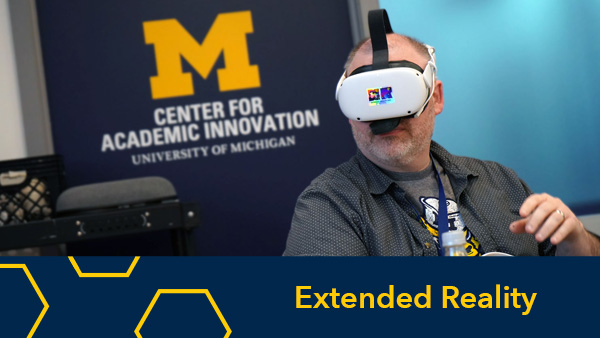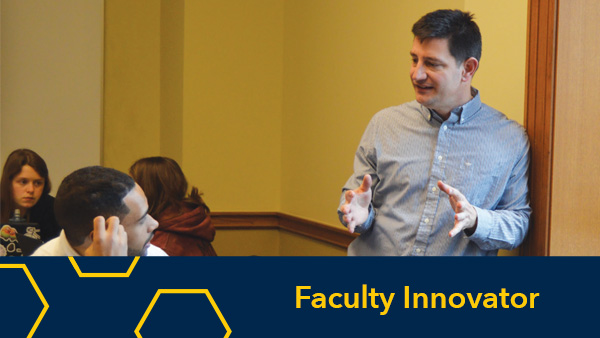Ricky LaFosse, Compliance and Policy Lead
Raven Lanier, Copyright Specialist
Yuanru Tan, Learning Experience Designer for Accessibility
Regulatory compliance is often thought of as an innovation killer.
It tends to bring to mind lengthy, boring code sections and complex and stifling bureaucratic procedures. At the Center for Academic Innovation, however, we believe that with the right approach, compliance and innovation are not only compatible but symbiotic. When compliance and ethical considerations are integrated into the design phases of new initiatives and when teams of innovators and compliance specialists work together toward common goals, such as enhancing educational quality, a spirit of collaboration forms, offering tremendous potential for interdisciplinary insights.
For instance, the design of a new online learning experience can ultimately be steered toward a more sustainable and inclusive direction through conversations around copyright, accessibility, and ways of evidencing quality considerations. Where compliance considerations would limit creativity at the cost of something valuable, such as quality or affordability, such issues can be flagged early and may inspire advocacy for rule changes. Or, collaborative problem solving can enter these early discussions, forging a new path that may be just as innovative and effective but avoids introducing risk to the University.
Meet the Team on the Ground
Ricky LaFosse, Compliance and Policy Lead. Ricky provides compliance guidance and supports policymaking efforts relating to distance education. He is also the designated State Authorization Network (SAN) coordinator for U-M, Ann Arbor, and provides insights on broader distance education policymaking efforts as a member of the University Professional and Continuing Education Association (UPCEA) Policy Committee.
Raven Lanier, Copyright Specialist. Raven provides the Center for Academic Innovation with intellectual property expertise, specifically in copyright law. In her role, Raven teaches faculty and staff about copyright in the online education space, covering issues like Creative Commons, open education, and fair use, and works closely with faculty in the development of their courses.
Yuanru Tan, Learning Experience Designer & Accessibility Coordinator. Yuanru collaborates with cross-functional course development teams to design online learning experiences with close attention to compliance with accessibility and usability principles. She serves as a resource within the Center for Academic Innovation to find pedagogical and technological solutions that make our projects and tools highly accessible to our constituents. She also facilitates workshops across U-M to educate faculty and staff on online education accessibility.
Our Approach and Guiding Principles
At Academic Innovation, we recognize compliance efforts are more effective, as well as less intimidating, when our specialists work collaboratively with our innovators in a supporting role. We do this by adopting a shared passion for the idea or innovation at hand, being proactive with initial compliance consultations for all new online and hybrid programs, and maintaining resources with multiple audiences in mind. For our formal partners, we also offer direct research and a suite of other compliance consultation services (e.g., guidance regarding copyright, accessibility, and vendor contracts). As we do this work, we keep the following guiding principles in mind:
1. Help the project move forward. In our combined experience, we would be hard-pressed to think of a single time that a pitch from a faculty member or administrator needed to be shut down as a result of a compliance concern. Instead, we strive to support academic innovation by researching and applying an appropriate process through which the idea can become reality. When necessary, we will reach out to relevant authorities to seek clarification and advocate for our position before recommending modifications that might negatively impact the project.
2. Protect and support students. Federal Program Integrity rules, privacy statutes, state consumer protections, and various civil rights laws were enacted to address actual problems and abuses. Rather than simply putting forward the minimum effort needed to demonstrate compliance for the sake of compliance, we believe regulatory considerations provide unique opportunities to start conversations around student needs, access to support services, and helping students make informed decisions about their education.
3. Keep lines of communication open. Projects and programs evolve just as regulations do. However, necessary communication may not take place, often due to missed information or misinformation (whether about relevant compliance issues or about the project itself) and the perception that reaching out creates more hassle than it’s worth. We find that providing sufficient context and asking the right questions up front is critical to ensuring future issues are identified and addressed, but we also recognize where administrative burden can factor into compliance efforts and will work with units to mitigate that burden.
If you have questions relating to, or would like to learn more about, distance education compliance, please do not hesitate to contact us.


